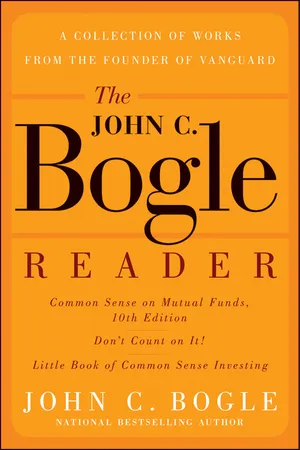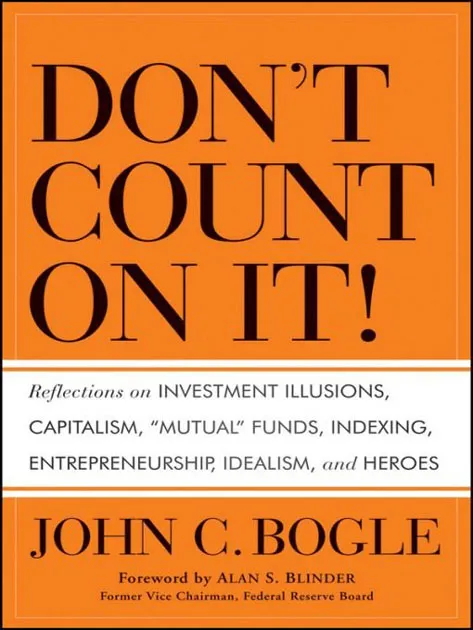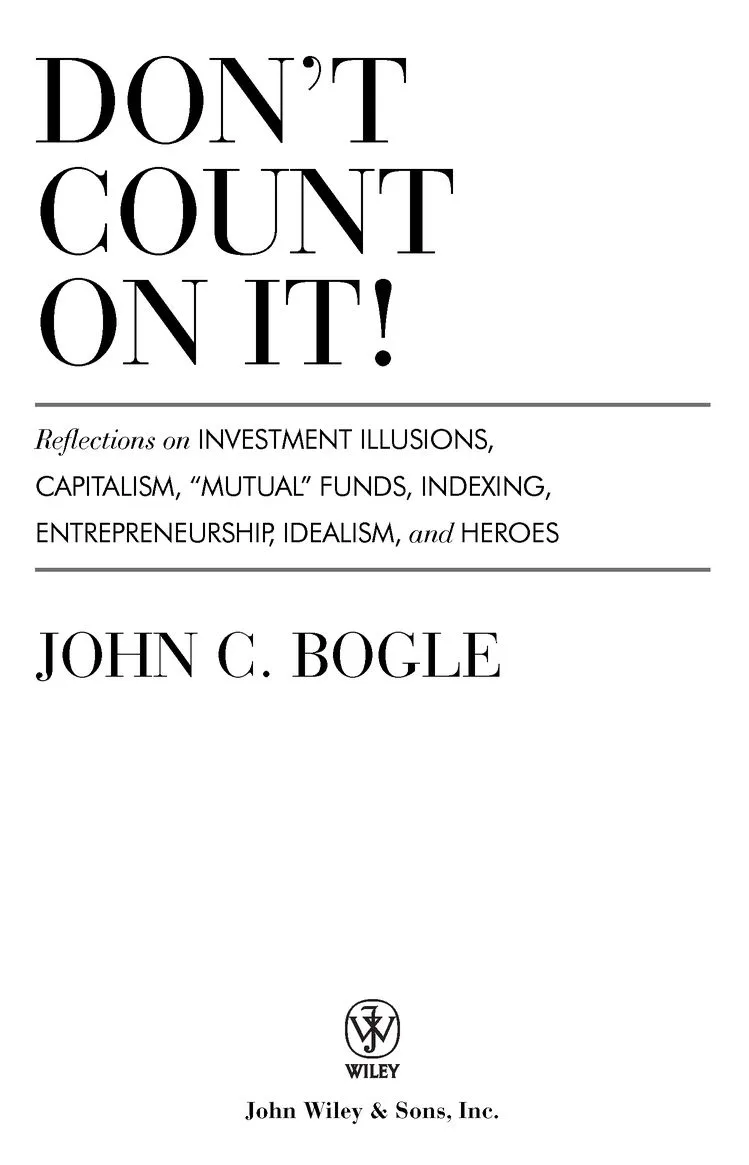
- English
- ePUB (mobile friendly)
- Available on iOS & Android
eBook - ePub
The John C. Bogle Reader
About this book
John Bogle's most influential investment books, available together for the first time
John C. Bogle, the founder of Vanguard, a trillion-dollar investment management company, is one of the most respected authors in the financial world. Now, for the first time, The John C. Bogle Reader brings togetherthree of his bestselling books in one definitive collection.
- Don't Count on It presents Bogle's unique insights into the world of mutual fund investing and the mutual fund industry
- Common Sense on Mutual Funds addresses how the mutual fund industry has changed over the past twenty years, and how best to arrange and manage funds in today's world
- The Little Book of Common Sense Investing recommends a simple, time-tested investment strategy sure to deliver the greatest return to the greatest number of investors
Essential reading for investors everywhere, The John C. Bogle Reader brings together the life-changing works of mutual fund pioneer John Bogle in one comprehensive anthology.
Tools to learn more effectively

Saving Books

Keyword Search

Annotating Text

Listen to it instead
Information


Copyright © 2011 by John C. Bogle. All rights reserved.
Published by John Wiley & Sons, Inc., Hoboken, New Jersey.
Published simultaneously in Canada.
Published simultaneously in Canada.
No part of this publication may be reproduced, stored in a retrieval system, or transmitted in any form or by any means, electronic, mechanical, photocopying, recording, scanning, or otherwise, except as permitted under Section 107 or 108 of the 1976 United States Copyright Act, without either the prior written permission of the Publisher, or authorization through payment of the appropriate per-copy fee to the Copyright Clearance Center, Inc., 222 Rosewood Drive, Danvers, MA 01923, (978) 750-8400, fax (978) 646-8600, or on the Web at www.copyright.com. Requests to the Publisher for permission should be addressed to the Permissions Department, John Wiley & Sons, Inc., 111 River Street, Hoboken, NJ 07030, (201) 748-6011, fax (201) 748-6008, or online at http://www.wiley.com/go/permissions.
Limit of Liability/Disclaimer of Warranty: While the publisher and author have used their best efforts in preparing this book, they make no representations or warranties with respect to the accuracy or completeness of the contents of this book and specifically disclaim any implied warranties of merchantability or fitness for a particular purpose. No warranty may be created or extended by sales representatives or written sales materials. The advice and strategies contained herein may not be suitable for your situation. You should consult with a professional where appropriate. Neither the publisher nor author shall be liable for any loss of profit or any other commercial damages, including but not limited to special, incidental, consequential, or other damages.
For general information on our other products and services or for technical support, please contact our Customer Care Department within the United States at (800) 762-2974, outside the United States at (317) 572-3993 or fax (317) 572-4002.
Wiley also publishes its books in a variety of electronic formats. Some content that appears in print may not be available in electronic books. For more information about Wiley products, visit our web site at www.wiley.com.
Library of Congress Cataloging-in-Publication Data:
Bogle, John C.
Don’t count on it! : reflections on investment illusions, capitalism, “mutual” funds, indexing, entrepreneurship, idealism, and heroes / John C. Bogle.
p. cm.
Includes index.
ISBN 978-0-470-64396-9 (cloth); ISBN 978-0-470-94900-9 (ebk);
ISBN 978-0-470-94901-6 (ebk); ISBN 978-0-470-94902-3 (ebk)
ISBN 978-0-470-94901-6 (ebk); ISBN 978-0-470-94902-3 (ebk)
1. Investments. 2. Portfolio management. 3. Business mathematics. I. Title.
HG4515.B64 2010
332.6—dc22
2010033295
Dedicated to my family:
The generations that came before,
The generations that light up my life today,
The generations yet to come.
The generations that came before,
The generations that light up my life today,
The generations yet to come.
Foreword
Did someone say, Don’t count on it? Or was it, don’t count on them? As everybody knows, America’s vaunted financial system let us down big-time during the raucous decade of the 2000s. The decade began with the spectacular stock market crash of 2000-2002, as corporate will-o’-the wisps, previously hyped by unscrupulous “analysts” who should have known (and did know!) better, collapsed before our eyes. That searing financial shock was followed in close order by the accounting scandals at Enron, WorldCom, and others in 2001-2002, the mutual fund scandals in 2003, and then, of course, the mother of all financial collapses: the stunning series of financial crises that started in the summer of 2007 and eventually brought the entire financial system to the brink of ruin and the world economy to its knees. With all this going on, you might have thought that America’s leaders, both political and financial, would have been frequently out on the hustings giving both detailed explanations and copious apologies. But you would have been wrong. The silence has been deafening.
Enter Jack Bogle, the conscience of Wall Street, if that’s not an oxymoron. More accurately, Bogle never left. His relentless voice, sharp pen, and indefatigable energy have been prodding the mutual fund industry in particular, and the financial industry more generally, to embrace higher business, fiduciary, and ethical standards for decades. Indeed, the essay that lends its name to this volume originated as a speech at Princeton University (Bogle’s alma mater and mine) in 2002, and a few of the others are older than that. Our financial leaders and public officials had plenty of time to set things straight. Would that they had listened to Bogle more. But, too often, his was a lonely voice in the wilderness.
That fine voice is in ample evidence here, in this worthy collection of 35 essays, many of them short and pithy. The essays range widely over the usual Bogle themes: the unconscionably high costs of financial intermediation, the disgraceful failure to abide by what should have been normal fiduciary standards, the inefficient absorption of too much high-priced talent into financial manipulation rather than into useful productive activities, the dismaying triumph of emotion over cool-headed reason in so many investment decisions, and the related—and sometimes ruinous—triumph of speculation over investment. If you’ve heard these themes expounded by Bogle before, listen again because the lessons still haven’t sunk in. If you haven’t, you’re in for a real treat, for Bogle writes not only with passion and conviction, but also with verve, wit, and literary flair. Where else, in a book on finance, will you find references to (in chronological order) Horace, Benjamin Franklin, Edgar Allan Poe, and Steven Colbert?
As a veteran of the mutual fund industry, and a father of low-cost index funds, it is no surprise that Bogle directs much of his ire at the high costs of financial intermediation. He never tires of reminding investors of this fundamental identity:
Net returns to investors = Gross returns on the assets - Costs of operating the financial system
The identity implies, among other things, that an investment adviser, or broker, or mutual fund manager earns his keep only if the gross returns he adds by “beating the market” exceed the costs he subtracts. Armed with reams of evidence to the contrary, Bogle is skeptical that this happens often. In Chapter 4, for example, he estimates that, in 2007, the costs of intermediation in securities came to a staggering $528 billion. That was 3.8 percent of GDP and, by remarkable coincidence, almost exactly the amount of money that all businesses in America spent that year on new factories, offices, and stores. Were the benefits worth the brobdingnagian costs? Bogle thinks not and he’s probably right. It will not surprise you to see the virtues of indexing—principally, the reduction of transactions costs—extolled by the man who brought us Vanguard. He should know—and he does.
The duties of a fiduciary have always commanded a central place in the Bogle pantheon of virtue and vice—and so it is here, in several essays that display both his strong moral sense and his limitless backbone. After all, as Bogle reminds us in the title of Chapter 19 (and elsewhere), “No man can serve two masters.” (Too bad so many Wall Streeters served more than two.) According to St. Jack, as he is sometimes called, “Fiduciary duty is the highest duty known to the law.” It requires, among other things, that the fiduciary “act at all times for the sole benefit and interests of the principal” and never “put personal interests before that duty” or “be placed in a situation where his fiduciary duty to clients conflicts with a fiduciary duty to any other entity.” Can you imagine how much milder the financial crisis would have been if Wall Street had adhered to those simple precepts? If not, read Bogle’s essays on the subject. You’ll see.
I could go on, but you’ve picked up this book to read Bogle, not Blinder. Let me just close with a wistful thought that sticks in my mind after reading these essays.
Once the financial cataclysm of 2007-2009 had passed its nadir, in about March 2009, policymakers, financial market experts, scholars, and others could turn their attention away from the emergency measures needed to prevent a total meltdown, and start thinking about the long-lasting structural reforms needed to build a sturdier and fairer financial system. It was a great national debate, which has already produced the landmark Dodd-Frank Wall Street Reform and Consumer Protection Act of 2010. And it’s not over. As the debate has progressed, I must confess to a mischievous and, frankly, somewhat undemocratic thought: Wouldn’t it be better just to turn the whole thing over to a small group of wise heads like Jack Bogle? When you finish this book, you’ll see why.
ALAN S. BLINDER
Gordon S. Rentschler Memorial Professor of Economics at Princeton University
Co-Director of the Princeton Center for Economic Policy Studies
Former Vice-Chairman, Federal Reserve Board
Princeton, NJ
May 2010
May 2010
Introduction
Our society has put its trust in numbers without realizing how ephemeral they often are and how easy it is to manipulate them. We’ve taken the status quo for granted, blithely projecting yesterday’s trends and today’s circumstances into the future, even the distant future. These deceptions played a major role in our unwillingness to recognize the profound flaws that have developed in modern-day capitalism. But the global financial crisis and the stock market collapse of 2007-2009 have finally forced us to examine those flaws. As the past three years have demonstrated, ignoring reality comes with a cost. This book attempts to explain how our society got to the place it is today and how we can begin to repair the widespread damage we have suffered.
More broadly, Don’t Count on It! is a book about how we deceive ourselves, and the consequences our society suffers when we fail to accept the realities of life. The purpose of the book is to present an anecdotal account of recent financial history, rife with examples of self-deception. Don’t Count on It! also aims to encourage our citizens to better understand our complex financial system—to examine it, to debate it, to challenge it, and to fulfill our duty to ask simple questions and demand answers that are understandable, intelligent, and above all, wise.
Clearly, we deceived ourselves by ignoring the forces that would lead to the disastrous recession that began in 2008. While I didn’t predict the housing meltdown that initiated the recession, I warned in October 2007 that such an unpredictable event had become a near certainty. The main clues were soaring debt; extreme market swings fostered by the triumph of speculation over investment; a shift from an economy focused on services to one dominated by finance; and a massive increase in financial complexity.
Well before disaster struck, I questioned what proved to be the catastrophic creation of credit default swaps (CDSs), collateralized debt obligations (CDOs), and structured investment vehicles (SIVs), which together played a starring role in the stock market crash and economic collapse of 2008-2009. In 2007, I worried about the impact of these “mind-bogglingly complex and expensive” products, and warned, “Now is the time to face up to these realities.” The Dodd-Frank legislation that was signed into law by President Obama in July 2010 represents the first attempt to reform the financial system and prevent future speculative collapses. The new reform law cannot guarantee such an outcome, but it may have made a repeat of the recent era less likely.
Part One, “Investment Illusions,” describes the folly of placing too much trust in numbers, and the catastrophic consequences that can follow. Among these illusions are the absurd notions that pa...
Table of contents
- Bogle
- Contents
- Introduction
- Common Sense
- Don't Count on It
- The Little Book of Common Sense
Frequently asked questions
Yes, you can cancel anytime from the Subscription tab in your account settings on the Perlego website. Your subscription will stay active until the end of your current billing period. Learn how to cancel your subscription
No, books cannot be downloaded as external files, such as PDFs, for use outside of Perlego. However, you can download books within the Perlego app for offline reading on mobile or tablet. Learn how to download books offline
Perlego offers two plans: Essential and Complete
- Essential is ideal for learners and professionals who enjoy exploring a wide range of subjects. Access the Essential Library with 800,000+ trusted titles and best-sellers across business, personal growth, and the humanities. Includes unlimited reading time and Standard Read Aloud voice.
- Complete: Perfect for advanced learners and researchers needing full, unrestricted access. Unlock 1.4M+ books across hundreds of subjects, including academic and specialized titles. The Complete Plan also includes advanced features like Premium Read Aloud and Research Assistant.
We are an online textbook subscription service, where you can get access to an entire online library for less than the price of a single book per month. With over 1 million books across 990+ topics, we’ve got you covered! Learn about our mission
Look out for the read-aloud symbol on your next book to see if you can listen to it. The read-aloud tool reads text aloud for you, highlighting the text as it is being read. You can pause it, speed it up and slow it down. Learn more about Read Aloud
Yes! You can use the Perlego app on both iOS and Android devices to read anytime, anywhere — even offline. Perfect for commutes or when you’re on the go.
Please note we cannot support devices running on iOS 13 and Android 7 or earlier. Learn more about using the app
Please note we cannot support devices running on iOS 13 and Android 7 or earlier. Learn more about using the app
Yes, you can access The John C. Bogle Reader by John C. Bogle in PDF and/or ePUB format, as well as other popular books in Business & Finance. We have over one million books available in our catalogue for you to explore.